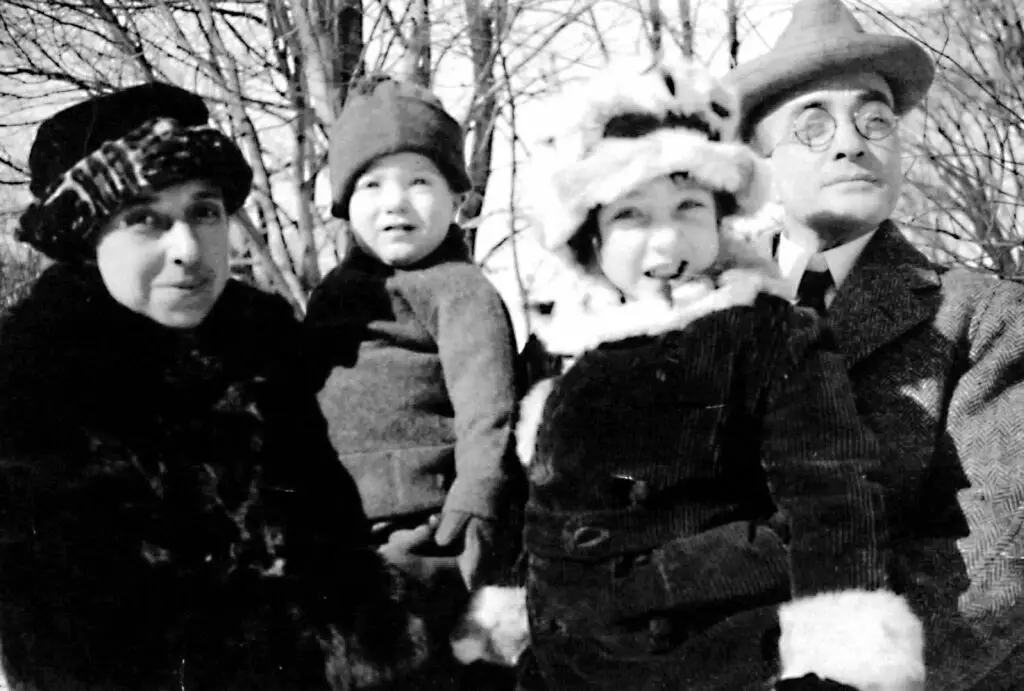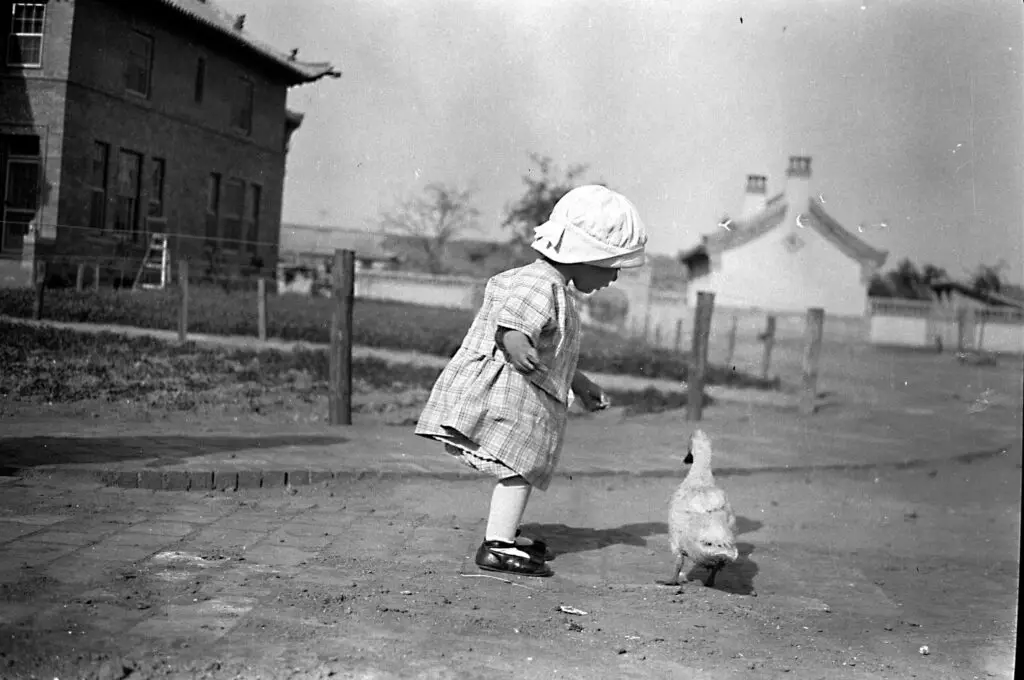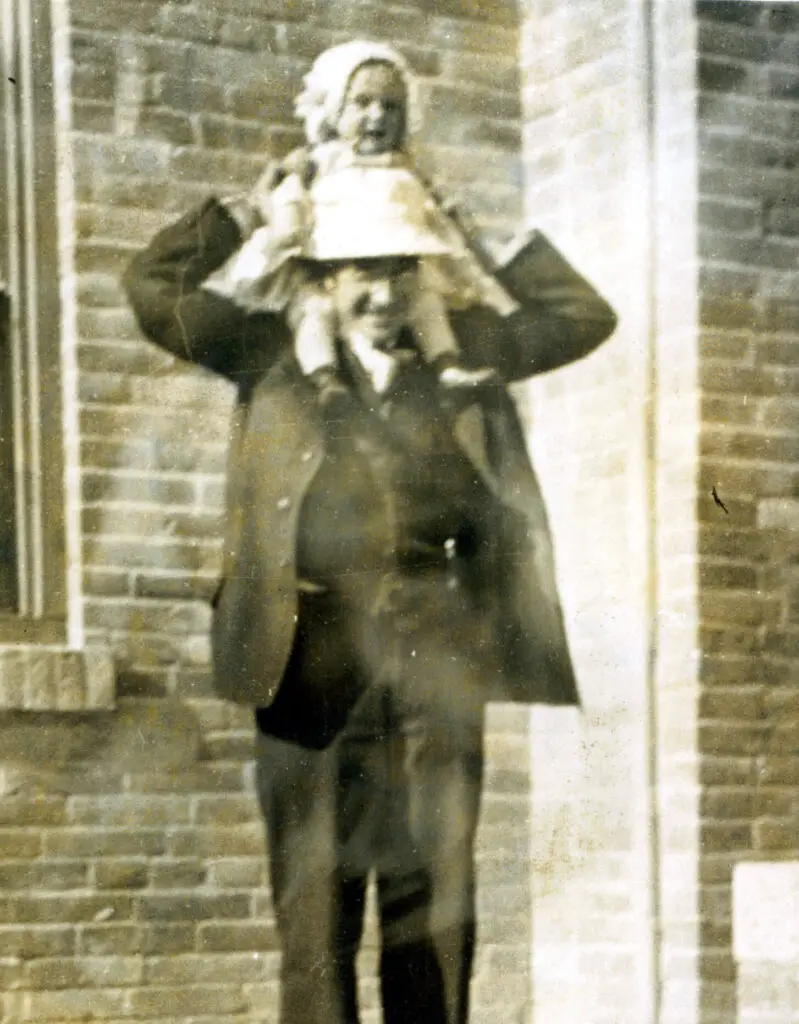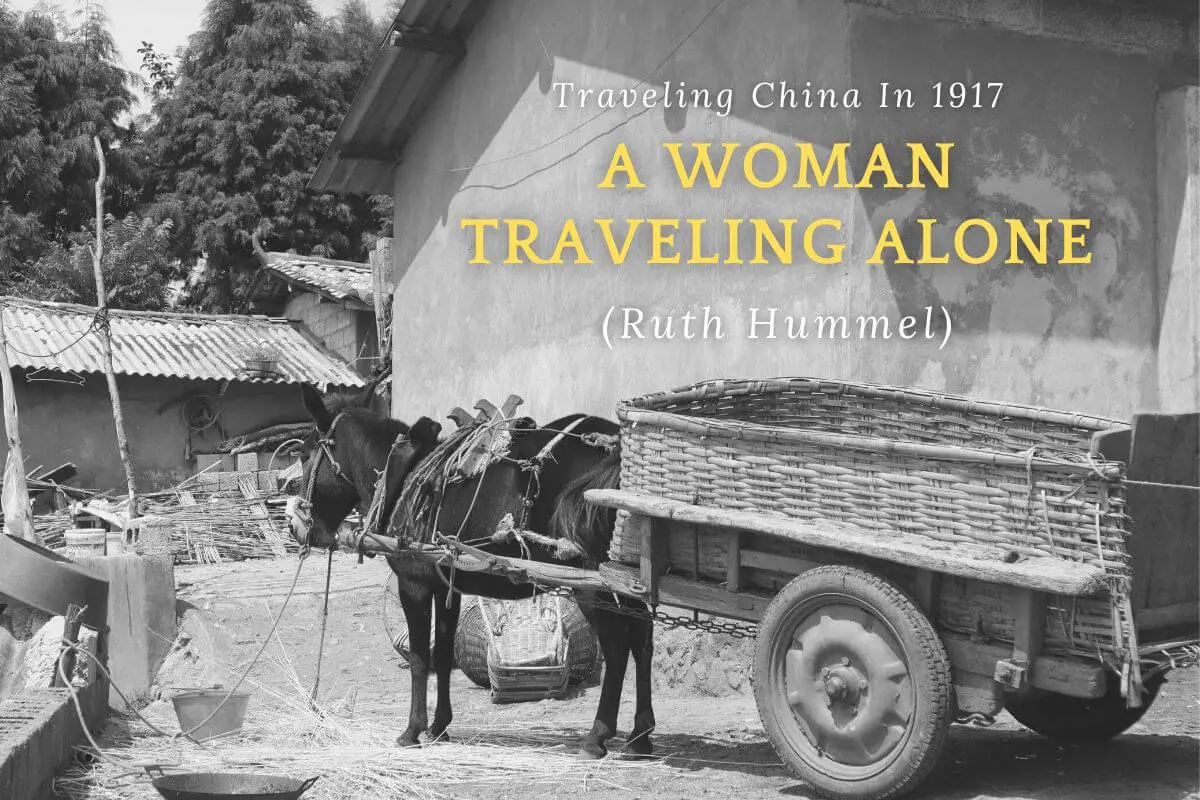Ruth Bookwalter Hummel lived in China with her husband Arthur Hummel in 1917; in this letter to her sister, she describes a journey she took to travel from the remote area of Fenyang, Shanxi, China, to Beijing.
In 1917 this journey took about a week as she traveled over some very rough roads; today, the trip would take a few hours on one of China’s high-speed trains.
Table of Contents
- Background To the Letter (1917) by Ruth Bookwalter Hummel
- Traveling In China (1917) From Fenyang China to Beijing, China, By Ruth Bookwalter Hummel
- Frequently Asked Questions
- Related Questions
Background To the Letter (1917) by Ruth Bookwalter Hummel
Ruth Bookwalter Hummel was a young married mother in China who along with her husband Arthur Wiliam Hummel were Christian Missionaries for the Methodist Church (American Board of MIssions). They lived in a very remote mission compound in present-day Fenyang, China.
They both taught at a high school that is still operating today; the school is considered one of the best schools in the Fenyang area of China.
When Ruth Bookwalter Hummel and Arthur William Hummel lived in this part of China, it would have been an extremely remote part of China. They lived in a mission compound in a lovely brick house that was still standing in 1986. At the time of writing this letter, her daughter Carol would have been just a baby (Carol was also born in 1917).
Ruth wrote this letter to her sister, who lived in the United States; she wrote to tell her sister about her journey to Beijing. Ruth gives us a first-hand account of what it was like for a woman to be traveling China alone in 1917.

Traveling In China (1917) From Fenyang China to Beijing, China, By Ruth Bookwalter Hummel
I ought to have a booklet printed to tell you about my trip to Peking (Beijing). It was certainly a wonderful experience for me to go out to see civilization again after an absence of three years. I surely packed a great deal of pleasure into eleven days of visiting. Even tho I had to spend 10 days going and coming, just in-traveling it was worth the time.
I could not take Carol on such a hard trip so I left her in Arthur’s and the nurse’s care. That she did not feel my absence is shown by her gain in weight of one pound and a half during the three weeks I was away. She also grew almost an inch. In anyone thinks that is a bit “fishy” I have Arthur as a witness. Now she is so pumped and fat and rosy-cheeked that everyone remarks she is the picture of health.
Traveling In China (1917)
I left Fenchoufu (Fengyang) in a Chinese cart one bright Wednesday morning. If you have ever ridden in a cart such as I rode in you would not I am sure envy me the trip. it is a springless two-wheeled affair whose interior space is three and a half feet long by two and a half wide; it is roofed over a rounding roof.
The axels are very wide apart and you appreciate the advantage of this when on the narrow road you are forced to climb halfway up a steep embankment while another cart passes you. Any other kind of cart would tip over in no time.
The worse thing is the terrible and never-ceasing jolting as one rides along. it would not be so bad if the roads were like yours at home but when you go over these unspeakable poor roads with ruts everywhere from a few inches to a foot or more deep you are jolted about in a truly miserable manner.
The advantage of this method of travel over the more comfortable ones is that it is cheaper! A litter which is a covered bed-like arrangement swung between two poles which are on the balanced on the backs of mules, is much more expensive. It is, however, more comfortable.
A Sedan chair is probably the most comfortable of all but the price of one for several days is quite prohibitive, So when we are going any distance alone we take carts.
Personally, I prefer riding donkeys back to any other method of travel. But the old man who was my escort would have had to have a cart [because] also my baggage required one so that a donkey would have been a greater expense, I cannot say that I enjoy cart riding for the jolting makes my back very tired and the bumps which my head gets as first one side and then the other rises up to meet my head usually gives me a hard headache.
It’s strange but it seems often as tho both sides of the cart simultaneously bump either side of my head! Such an account as I have given might cause you to think that every moment in a cart is misery. It isn’t quite that bad, and many people do not mind it at all, but to me, it is far from comfortable tho not unbearable.
The first day’s journey to Taiyuanfu (Taiyuan China) where I took the train was more than usually comfortable for the carter took an unused road which did not have so mar y ruts in it, for several hours. Forty-three miles that day, an unusually long hard day and did not stop for the night until nine o’clock.

Staying In An Ancient Chinese Inn (1917)
The inn where we stayed was a weird-looking place to come into at night with the shadows of the torches on the mud walls and ie animals all crunching their feed in the stalls at one side while the carts with their load of freight or baggage were standing about in the dim shadows.
As we rode into the gateway the servant who was accompanying me called out his greetings to the innkeeper and then shouted, “The best and cleanest room for the foreign missus.” An answering shout went up from the innkeeper and he ran out of the main room with a torch in his hand.
I was escorted with much formality to the guest room. I am quite accustomed to Chinese inns by now so I was not shocked at the smoky walls, the dirty brick floor, and the rickety furniture. I was much amused to read the scrolls which said that this was a “Happy Peace” inn noted for its good innkeeper.
These scrolls are supposed to be presented by famous guests who wish to express their approval of the service they’re received. It was a fairly large room about eight by ten feet, and the greater part of the room was occupied by the brick “Kang” or high platform which is the Chinese bed in this part of China.
On the Kang was a tiny low table that looked like a doll’s table. The Chinese sit with their legs crossed tailor fashion about this table when they eat.
I however sat on the edge of the Kang and dangled my feet over the side. I know that the room was dirty but the darkness and the flickering light from the little bean oil lamp hid the truth.
These tiny little lamps just like they were used in the time of Noah always interest me. A tiny bit of hemp hangs over the edge of the lamp bowl and serves as a wick. By demanding another lamp wick and using the two together I was able to get enough light to see to eat and get my bed arranged for the night.
I set up my camp cot on the Kang and spread my covers over it; then I looked about to see how I might get some ventilation. The Chinese always seal up with paper their windows so there is not a crack for fresh air to leak through.
People sleep in these rooms for years and one could truthfully say that in this inn they had been sleeping there for more than a hundred years. The paper is never changed except when by accident or through the wind or rain some is torn away.
The window was about four feet square and I proceeded at once to demolish the paper for about half the distance down. In doing so I discovered that the paper under the roof, which had not been changed as recently as that below literally fell to ashes in my hands, and the dust from It filled the air.
In the morning I had to pay for the paper at a rate that seemed to say that it had some historic value. The innkeeper would not be satisfied until I had richly reimbursed him.
Before rolling into bed I pulled the rickety table before the door and balanced my wash bowl on it in such a way that should anyone try to enter the room it would make a noise in its fall and awaken me. This is a trick I learned from Arthur.
It seemed to me that all the night long the carter carried food to his animal. No doubt my surmise was partly correct for they do feed the animals a great deal at night on these journeys.
I did not get much sleep and by four o’clock was quite ready to respond to the call of the servant ready for another day’s journey. I thought with such an early start we would be the first on the road, but I saw the tracks of still earlier carts in the dust newly laid by a shower in the night.
The Journey to Beijing, China (1917)
All the journey up north to Taiyuanfu (Taiyuan, China) the road goes right along the base of the mountains which form the western barrier of our fertile plain. I never grow tired of watching the changing contour of the mountains as one goes on and on in vain trying to discover when he has reached a point for which his eyes have long been watching.
Every few miles are towers that were used as watch towers in the old days and are spoken of in the travels of Marco Polo -when he made his tour through our land. We traveled through miles and miles of grape arbors which a few weeks before must have been a glorious sight but were now only the wreck of their former splendor, their branches stripped of the fruit.
By noon we reached the city with the famous spring and I hastily ate my lunch so that I might visit it for a few minutes. How beautiful it is! The water rushes out in a large stream and the stone bridges, the clear pools, the pagodas, shrines, and richly carved and embossed temples make a lovely sight.
By five o’clock in the afternoon, we reached Taiyuanfu (Taiyuan China) having made the two and a half days trip in two days. I did this to save time for I did not wish to be on the road any longer than I could help.
At the gate of the city, we were halted and carefully questioned. This questioning is more strict than it used to be; having grown so ever since the Japanese have been trying to get their hold on China. All foreigners are somewhat under suspicion.
I had to present my Chinese card and Arthur’s as well. How good it seemed to see paved streets again and electric lights, rickshaws, and a few foreigners walking about.
Early the next morning I was off for the station and saw a train again for the first time in three long years. Should I go into the detail of the train journey it would be monotonous to you whom train riding is a commonplace occurrence.
But to me just to see a train again made shivers of joy go up and down my back and to ride in one after the two days rough cart ride was bliss indeed. I traveled second class which on this Belgium line is very comfortable and after the European plan; I had a compartment which I occupied alone.
I love these first days’ ride through our lovely rugged Shanei mountains. We wind in and out and up and up until the air feels rare. A number of very fine turns are made inscribing five eights of a complete circle and we go in and out of the tunnels and gaze far down to the little stream running over the rocks below.
The persimmon trees were full of fruit which looked like large tomatoes hanging red and glossy in the sunshine. A few trees had turned red and these were the first red leaves I have seen since I left America four years ago.
Our trees turn yellow and we always greatly miss the beautiful fall tints. At five in the afternoon, I reached a station ten miles from the Junction, and here I spent the night with some China Inland people, Mr. and Mrs. Green who, during the terrible Boxer days, fled from this place and through many wonderful and narrow escapes were at last saved by a miracle alone and reached Tientsin in safety. Not however until their little girl fell a victim to dysentery, and was buried by the way.
They are rare, lovely people and it is a blessing just to know them. The next morning I was up at four in order to catch the early express from the Junction ten miles away. I rode the distance in a cart and starting as we did while the moon was still up, the ride was lovely. I saw the dawn break and the men come out to their fields each carrying his implements on his back.
Nothing may be left out overnight for fear of theft so they must wearily carry their things back and forth. I arrived at the Junction in plenty of time only to find that the express was later than the slow train and would not be in until nearly noon! This is a Chinese line with no accommodations at all and I had to sit outside on the bench where all the Chinese might see me and stare their fill.
Visiting Beijing and Tianjin China (1917)
The ride from the Junction to Peking (Beijing, China) is not so interesting to me for it is over a flat plain and I like the mountains best, I arrived in Peking (Beijing, China) at night and by full moon wended my way to the Mission (American Board of Missions) feeling mighty happy and glad to be back again among such interesting sights as the city offers and among old friends.
I was seven days in Peking visiting and doing some shopping and then two days in Tientsin (Tianjin, China). The stores in Tientsin (Tianjin, China) are quite like those at home and it was such fun to shop there and just to look at foreign things although the prices made their purchase an impossibility.
While there I also went to a Moving Picture Show (the Cinema), and oh what heaps and heaps of fun it was, It was a good film, a clean one and the music of the orchestra seemed very “classy* to me. Moreover, it seemed good just to be a little worldly again! I forgot all about that I was a missionary in the interior districts (for a few minutes!).
One of the finest things about the whole trip was the two Sunday services in Peking (Beijing, China). Unless you have been for some time cut off from worshiping with a large group of your own countrymen [speaking in your] own tongue you cannot appreciate how good it seemed to take in the singing. Never did the old hymns ring out as those did and did I appreciate as never before how much a group adds to the spirit of worship.
The days passed all too quickly and almost before I knew it the time had come when I thought I ought to. return. On my homeward way, I stopped at our mission station at Paotingfu which I had never before visited. I appreciated the opportunity to see other stations at work and was much impressed with what this station was doing especially for the women of the city.
Visiting Other Christian Missions in China (1917)
I also stopped with the Brethren mission at the edge of our Shansi (Shanxi) Province and visited these people away up in the mountains at an altitude of 4,000 feet. They have had to very gradually make their place in that district but they are building solidly for [the] future, and have a large work ahead of them.
I also stopped off for a day at Taiku (Taigu, Shanxi, China) having been forced to do so on account of the fall of the first snow which had left the roads in bad condition and the carter refused to go on. You can imagine how happy I was at last to see the walls of Fenchoufu (Fengyang, China).

Life As An American Christian Missionary in Fengyang, Shanxi, China (1917)
Home seemed inexpressibly good and Carol many times cunninger and sweeter than ever. Also, I might add I was glad to see Arthur again too; we have not been often separated since we were married and it was good to see him again.
The trip did me a world of good. If one has been here too long he begins to get stale and a longing comes to get out for a bit and see how the world is a wagging. I feel years and years younger (that makes me very youthful now, doesn’t it!) and more fresh than I have [been] for a long time.
During my absence, Arthur taught my English class every day, and [when] added to his own and the care of Carol he had no time at all to himself. The High School is having a good year again this year, and the boys enjoy the fine new building and the warm rooms very much.
Arthur has organized a Walking Club which goes out into the country to places of interest on Saturdays and which the boys take much interest in. More boys are now applying for work than can be accommodated, tho at first the feeling that it lowered a boy’s position was a drawback to any manual labor for self-help.
We are trying to get a good Glee Club organized. I have charge of it and just now we are practicing for Christmas. Most of the best singers among the older boys graduated last year so we have to work it up largely from new material.
As I write Arthur is over in our sister station at Taiku (Taigu, China), a two days journey away, attending a meeting of all the missions with a view to uniting in educational work in this Province. While he is away I have three hours of class work each day and I won’t be sorry to have him come back to relieve me of two of them.
Thanksgiving is to be at our house this year so this week is busy preparing for that.
This letter was typed from an original typed letter in very poor condition in the possession of Sharman Bookwalter Hummel, son of Arthur William Hummel Sr. and Ruth Emma Bookwalter Hummel. Spelling and some punctuation has been edited.
Sharman B, Hummel
The Hummel Family is a website all about Family History research. We focus on Swedish, German, English, Scottish, and American Genealogy. We also discussed Asia and China, as we had ancestors who spent many years in China.
You are welcome to join us and become part of our community by signing up for our FREE newsletter, The Hummel Family; sign up by clicking here.
Check out our Youtube Channel, Family History Buzz, by clicking here.
Frequently Asked Questions
Who was Ruth Hummel and why did she travel to China in 1917?
Ruth Hummel was a woman who lived in China with her husband, Arthur Hummel, in 1917. She undertook a journey from Fenyang, Shanxi, to Beijing.
Why did Ruth Hummel travel alone to Beijing?
Ruth Hummel traveled alone to Beijing to likely attend to matters or activities that required her presence in the city, despite the challenging journey at that time.
What were the conditions of the roads during Ruth Hummel’s journey in 1917?
Ruth Hummel’s journey involved traveling over rough roads that were likely unpaved and not well-maintained, making the journey difficult and time-consuming.
How long did the journey from Fenyang to Beijing take in 1917?
In 1917, Ruth Hummel’s journey from Fenyang to Beijing took about a week due to the rough roads and transportation limitations of that time.
What mode of transportation did Ruth Hummel use for her journey?
Ruth Hummel likely used traditional forms of transportation available in that era, such as horse-drawn carts or mule-driven carriages, for her journey.
What challenges did Ruth Hummel face while traveling alone in 1917 China?
Ruth Hummel likely faced challenges such as communication barriers, navigation difficulties, and potential safety concerns while traveling alone in a relatively remote and unfamiliar area of China.
What was the significance of Fenyang, Shanxi, during that time?
Fenyang, Shanxi, was likely a rural and less-developed area in 1917. It might have had limited access to modern amenities and transportation compared to larger cities like Beijing.
How does the travel experience described by Ruth Hummel compare to modern travel in China?
The travel experience Ruth Hummel described in 1917 was considerably more arduous and time-consuming than modern travel in China, which benefits from high-speed trains and well-maintained road infrastructure.
Related Questions
The Old Silk Road – China’s Old Silk Road History
This article deals with the long Overland route from north-east China to Chinese Turkestan (now Xinjiang) to Persia and Asia Minor. It was the route by which Chinese pilgrims made their way to India in search of Indian philosophy and wisdom. Marco Polo traveled it about A.D. 1272 when he set out to the court of the Great Khan.
You can read more about The Old Silk Road – China’s Old Silk Road History by clicking here.
What Are Some Chinese Proverbs About Life and Living?
My grandparents Arthur and Ruth Hummel lived in China in the early 1900s. During this time they started to collect and translate Chinese proverbs. We have over 175 of their Chinese proverbs categorize by the subjects they set for them.
You can discover more Chinese proverbs by reading our blog Over 175 Inspirational Chinese Proverbs On Life And Living by clicking here.
